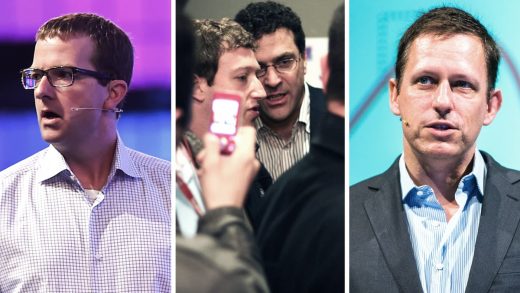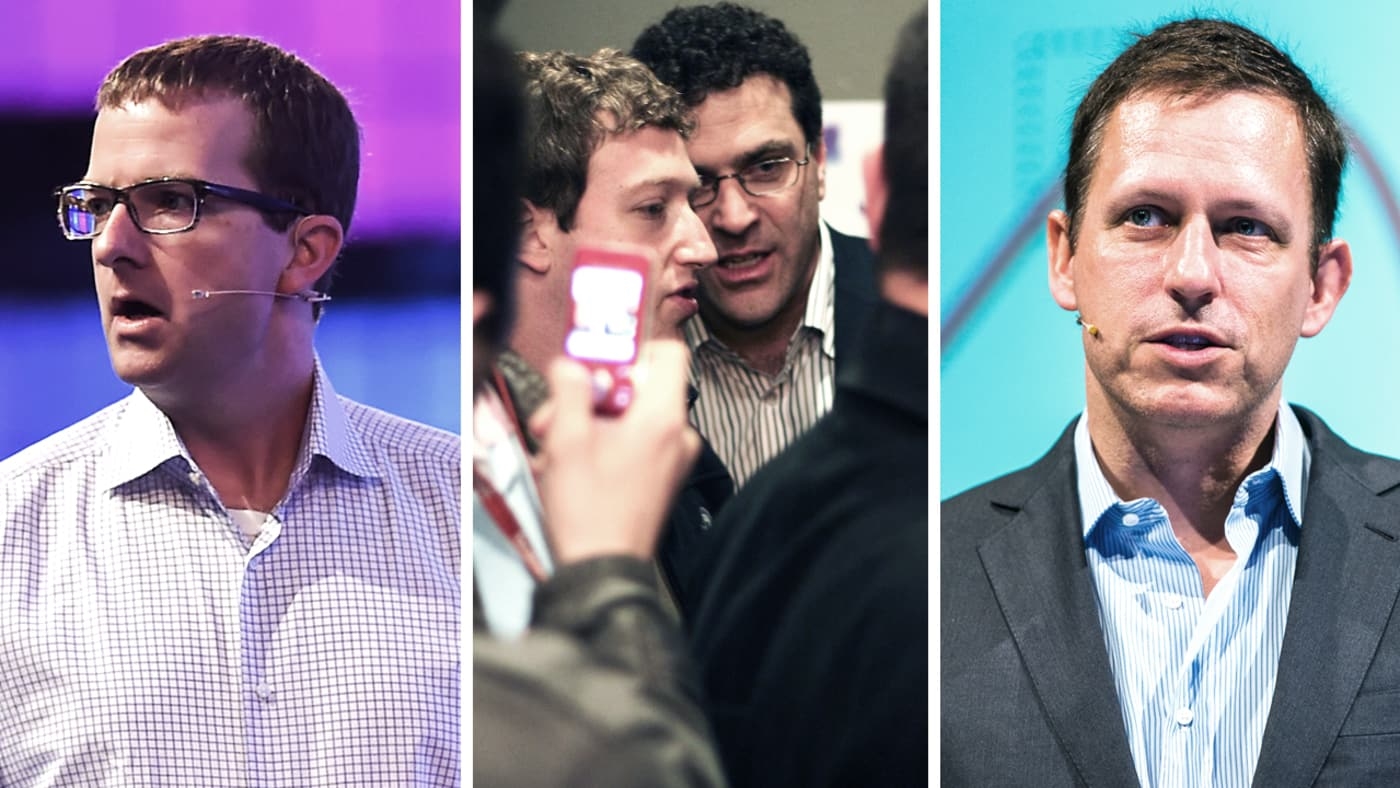Here’s The Brain Trust Of Advisers Steering Mark Zuckerberg Through This Crisis
Today, Mark Zuckerberg testifies before Congress. It’s a long-awaited and much-anticipated move to make amends with both the government and millions of disillusioned users who learned that the social network allowed third parties to hijack their personal data and use it for political targeting.
The founder and CEO will be asked many questions–spanning from Facebook’s interplay with Cambridge Analytica to its ability to crack down on potential foreign interference in U.S. elections. And though Zuckerberg is the face of the company, he isn’t the only one making the big decisions. He has long had a close group of Facebook employees and board members who have helped the company grow, scale, and overcome obstacles.
Most of these people have been around since very early on–and they’ve remained steady figures in Zuckerberg’s inside circle. While Sheryl Sandberg is certainly the second in command–as well as someone who will also be in the spotlight in the future–these others play an enormous role in helping craft Facebook’s plan moving forward.
Here’s a look at the group of close advisers, who have been coaching and helping Zuckerberg through the company’s rough times.
The Top Brass
Mike Shroepfer, sometimes referred to as Shrep, has been at Facebook since 2008. He was first brought on to lead its engineering strategy, and has risen through the ranks to chief technology officer. Today, his role keeps the back end afloat; Shrep OKs and devises technical fixes to the platform, as well as spearheading new initiatives such as Facebook’s foray into VR with Oculus. He generally doesn’t comment too much in public–though he’s been known to talk to the press and recently published a Facebook post describing how the platform will limit the third-party APIs. When there’s a technical question about Facebook that requires an authoritative answer, Shrep is the person who will most likely be passed the microphone.
Chris Cox is Facebook’s chief product officer, a 13-year Facebook veteran and one of the most senior people at the company. He oversees all new products and features, as well as the design and marketing teams. Thus, he’s the guy quietly trying to weather this storm and will be involved in any changes to the Facebook user experience in response to the current kerfuffle. Last year, before these most recent scandals, Cox was responsible for explaining Facebook’s change in motto: Bringing the world closer together. When Zuckerberg announced the company’s new mission statement–along with product updates to community features like Groups–Cox was part of the media rodeo helping to describe the new programs. Before that, he was the person who spearheaded Facebook’s News Feed, and has been so key to the company’s culture that new Facebookers traditionally meet with him as part of their onboarding process. In the coming weeks, Cox will testify before the U.K.’s parliament in lieu of Zuck.
The VPs
Elliot Schrage is Facebook’s VP of global communications and public policy. Like many other brain trusters, he’s been at the company for nearly a decade; his role as the company’s public relations chief is slapping a palatable veneer onto the historically secretive company. Schrage controls both Facebook’s and Zuckerberg’s messaging to the world–crafting and executing the company’s now-famous penchant for speaking out of both sides of the mouth. Schrage has posted multiple blog updates about Facebook’s impact on elections. In the last few months he openly admitted that the company hasn’t done great implementing its communication strategy over the last year. His imperative now seems to to be to figure out how to better talk to users to prevent current controversies from permanently tarnishing the company’s reputation.
Carolyn Everson, Facebook’s VP of marketing, is one of the main architects of the company’s lucrative and often-criticized advertising program. This system Everson helped build out is what firms like Cambridge Analytica capitalized on. And now Everson is one of the few public faces trying to fix the damage. Last month she admitted at an event that she was “outraged and beyond disturbed” by the recent revelations and has been making a public relations blitz in an effort to assuage Facebook’s biggest advertisers.
PayPal veteran David Marcus leads Facebook’s messaging products, one of the most important and data-sensitive arms of the social network. He oversees the Messenger app, which, after being spun off from the main Facebook app, has grown rapidly but has taken its time in terms of monetization strategy. Over the last year, he’s defended the company’s reputation. “When you design a platform that reaches 2 billion people every month, sometimes bad things happen,” he said late last year. Some months later, Zuckerberg agreed to more actively fight against these bad things. Meanwhile, Marcus continues to develop new products–most recently he received flack for Facebook’s Messenger Kids program. He recently joined cryptocurrency exchange Coinbase’s board, while telling press that Facebook likely won’t enter that space for a while. Given his expertise, he continues to be one of the main people leading Facebook’s messaging and payments strategy.
Lori Goler may hold one of Facebook’s more difficult jobs–at least lately. She runs the company’s human resources. And given the onslaught of negative press, morale at the company has been at an all-time low. Goler has been Facebook’s head of people for a decade–and has been the person behind its sexual harassment policies, as well as numerous other internal edicts. As the company enters a less idealistic era, she will deal with any internal strife as well as hiring, a traditional Facebook strength which could be impacted if the company suddenly looks less like a corporate nirvana.
The Board
Considering that he’s one of the quietest members of the brain trust, Peter Thiel is certainly one of the most well-known and controversial. As the company’s first outside investor, he has sat on Facebook’s board of directors for quite a long time. After Thiel publicly supported Donald Trump–as well as bankrolled a lawsuit that killed Gawker–many have called for Zuckerberg to remove the man from the company’s board. Yet he still remains on the board, and has remained helpful as one of the few conservative Facebook insiders. In the past, he’s helped lead discussions with right wing figureheads who believed the social network was liberally biased. Most recently, in a rare interview, Thiel said that the board’s job is to “to help think about some of the medium- and longer-term problems coming around the corner.” Despite his controversial status, given his longtime place with the company he remains a mercurial graybeard the company has long relied on–even if he’s butted heads with other board members.
Marc Andreessen, the cofounder of venture firm Andreessen Horowitz and one of the inventors of the web browser as we know it, is a long-time Zuckerberg mentor. Andreessen used to be known as a Twitter-friendly tech commentator, that is until he tweeted a comment that seemed in support of British colonialism in India. Zuckerberg publicly condemned Andreessen’s comment, the investor apologized, and then he swore off Twitter. We haven’t heard much from him since then, but Andreessen is still a very active member of Facebook’s board. He helps run the board’s governance, something that is actively being questioned of late as Zuckerberg’s overwhelming control of the company comes into question for perhaps the first time. With the company thrust into the spotlight, Andreessen–along with other board members and Zuckerberg–will be behind closed doors trying to keep their interests in mind while attending to mounting shareholder concerns.
Jan Koum, another Facebook board member and CEO of WhatsApp, has direct access to Zuckerberg, a long-time friend who purchased WhatsApp in 2014 for $19 billion. As a member of the board of directors, Koum joins Thiel and Andreessen as part of the select few of rich decision makers who work with Zuckerberg directly. Before Facebook’s acquisition, Koum was known to espouse the mantra “advertising sucks,” which can only be considered the opposite of Facebook’s business ethos. Even with this difference, Zuckerberg has certainly had an influence on Koum, as the messaging app is now beginning to integrate monetization features such as the ability for businesses to conduct customer service using it. In the wake of the Cambridge Analytica scandal, Koum’s WhatsApp cofounder Brian Acton, who left Facebook in 2017, recently tweeted that people should delete Facebook. Koum, though more circumspect, is known to proudly publish conservative-leaning posts on his Facebook page. And he continues to be an active voice Zuckerberg listens to.
Between these nine technology leaders, Zuckerberg has a private team of in-house counsel. They’ve helped him lead Facebook for years, and will likely continue to do so. As he continues to be forced into the spotlight, we’ll see just how good their tutelage is.
(49)



